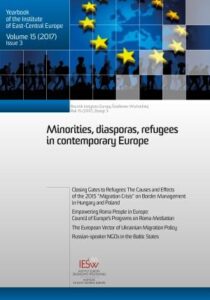ORCID: Aleksandra Kuczyńska-Zonik: 0000-0002-5672-9613
Afiliacja: John Paul II Catholic University of Lublin, Poland
Strony: 165-183
Wydanie: Lublin 2017
DOI: --
Sposób cytowania: A. Kuczyńska-Zonik, ‘Russian-speaker NGOs in the Baltic States’, Yearbook of the Institute of East-Central Europe, Vol. 15, No. 3, 2017, pp. 165-183.
Słowa kluczowe: NGO, non-governmental organizations, Russia, Russian-speaking community, the Baltic States
Abstrakt:
The aim of this paper is to explore the issue of Russian-speaker nongovernmental organizations (NGOs) in the Baltic states that are engaged in the promotion of Russian culture and language as well as in the representation of Russian-speakers’ rights. As many surveys and much research concerning the Russian-speaking diaspora in the Baltic states have been conducted, it is important to indicate the characteristics of these NGOs as an essential factor of articulating the diaspora’s interests. In the empirical analysis, the author will use quantitative and qualitative measures of these organizations’ form, structure, activities, and members. As a result, it is argued that these NGOs in the Baltic states are moderately successful. While it is an opportunity for the Russian-speaking diaspora to mediate between society, the state authorities and the international community, these NGOs have influenced the consolidation of the Russian-speaking population in the Baltic states only to a small extent. Additionally, under some circumstances, these NGOs can be considered to comprise a Russian soft power tool of influence in the Baltic states.
Bibliografia:
AALEP, Russian GONGOs and NGOs, Association of Accredited Public Policy Advocates to the European Union (AALEP), 10 July 2016, http://www.aalep.eu/russian-gongos-and-ngos [2017-08-16].
Aidarov, A. and W. Drechsler, ‘Estonian Russification of Non-Russian Ethnic Minorities in Estonia?’, Trames, vol. 17, no. 2, 2013, pp. 103-128.
Auers, D., Comparative Politics and Government of the Baltic States, Palgrave Macmillan UK, 2015.
Birckenbach, H.-M., ‘Half Full or Half Empty?’, The OSCE Mission to Estonia and its Balance Sheet 1993-1999, ECMI Working Paper, no. 6, 2000.
Buzayev, V., Legal and social situation of the Russian-speaking minority in Latvia, Averti-R, SIA, 2013.
Buzayev, V. [Бузаев, В.] (ed), Правовое и фактическое положение национальных меньшинств в Латвии [Legal and actual situation of national minorities in Latvia], Riga: Averti-R, SIA, 2015.
ERR, ‘Over 40 Russian-funded NGOs operate in Baltic states’, News ERR, 7 September 2015, http://news.err.ee/116670/over-40-russian-fundedngos-operate-in-baltic-states [2017-08-16].
Estonian Internal Security Service, Estonian Internal Security Service Annual Review 2016, Tallinn, 2016, https://www.kapo.ee/en/content/annual-reviews.html [2017-08-17].
Estonian Internal Security Service, Estonian Internal Security Service Annual Review 2008, Tallinn, 2008, https://www.kapo.ee/en/content/annualreviews.html [2017-08-17].
Frėjutė-Rakauskienė, M. [Фреюте-Ракаускене, M.], ‘Неправительственные организации русских Литвы: основные социальные характеристики’ [Main Social Characteristics of Non-governmental Organizations of Lithuania’s Russians], Etniškumo studijos [Ethnic Studies], Special issue: Русские в Балтийском регионе: меньшинство и государство [Russians in the Baltic region: the minority and the state], vol. 2, 2007, pp. 93-115.
Goble, P., ‘Ethnic Russians In Baltic Countries “Love Russia but Don’t Consider It Their Home’’’, The Interpreter, 30 December 2014, http://www.interpretermag.com/ethnic-russians-in-baltic-countries-love-russia-butdont-consider-it-their-home/ [2017-08-17].
Government of the Republic of Lithuania, Department of National Minorities [Tautinių mažumų departamentas prie Lietuvos Respublikos Vyriausybės], Tautinių mažumų organizacijos, 2016 [National Minorities Organizations, 2016], Vilnius, 2016.
Goble, P., ‘Latvian MP: Moscow using Russian organizations to destabilize Latvia’, Euromaidan Press, 9 March 2015, http://euromaidanpress.com/2015/03/09/latvian-mp-moscow-using-russian-organizations-todestabilize-latvia/#arvlbdata [2017-08-16].
Jansons, A., ‘Ethnopolitics in Latvia: Ethnopolitical. Activities of State Institutions and Non-governmental Organizations and their Influence on the Social Integration Process’, Ethnicity Studies, 2003, pp. 124-133.
Kaldur, K., Sutrop I. and K. Kallas, Political participation of third country nationals on national and local level. Country Report of Estonia, Institute of Baltic Studies (IBS), 2011, https://www.ibs.ee/wp-content/uploads/IBS_ESTONIA_country_report.pdf [2017-08-16].
Kallas, K., ‘Claiming the diaspora: Russia’s compatriot policy and its reception by Estonian-Russian population’, Journal on Ethnopolitics and Minority Issues in Europe, vol. 15, no. 3, 2016, pp. 1-25.
Kasatkina, N. and T. Leončikas, Lietuvos etninių grupių adaptacija: kontekstas ir eiga [Adaptation of ethnic groups in Lithuania: Context and process], Vilnius: Socialinių tyrimų institutas, Eugrimas, 2003.
Kuczyńska-Zonik, A., ‘Antidiplomacy in Russia’s Policies Regarding Russian-Speakers in the Baltic states’, Baltic Journal of Politic Science, no. 5, 2016, pp. 89-104, DOI: https://doi.org/10.15388/BJPS.2016.5.10338.
Matulionis, A. [Матулионис, A.] and M. Frėjutė-Rakauskienė, [M. Фреюте-Ракаускене], ‘Идентичность русской этнической группы и ее выражение в Литве и Латвии. Сравнительный аспект’ [Identity of the Russian ethnic group and its expression in Lithuania and Latvia. Comparative aspect], Мир России. Социология. Этнология [The Russian world: Sociology. Ethnology], Москва [Moscow]: Национальный исследовательский университет [National Research University], vol. 23, no. 1, 2014, pp. 107-109.
Poppe, E. and L. Hagendoorn, ‘Types of Identification among Russians in the “Near Abroad”’, Europe-Asia Studies, vol. 53, no. 1, 2001, pp. 57-71.
Report by Maksim Nikolajev (NGO “Russian School of Estonia”) at OSCE Human Dimension Implementation Meeting (HDIM), Warsaw, 1 October 2015.
Resolution of the 6th conference of NGOs of Russia’s compatriots in Latvia, 24 August 2013.
Russian School of Estonia, Statement by NGO “Russian School in Estonia”, 29 September 2014.
Security Police [Drošības policija], Publiskais pārskats par Drošības policijas darbību 2016.gadā [Public Report on Security Police Activity Operation in 2016], Riga, 2017, http://www.dp.gov.lv/lv/?rt=documents&ac=download&id=18 [2017-08-17].
State Security Department of the Republic of Lithuania, National Security Threat Assessment, Vilnius, 2017, http://www.vsd.lt/Files/Documents/636265688721000000.pdf [2017-08-17].
Struberga, S., ‘Non-governmental Organizations: Source for Inclusion or exclusion?’, in: Ž. Ozoliņa (ed), Societal Security. Inclusion-Exclusion Dilemma. A portrait of the Russian-speaking community in Latvia, Zinātne, 2016, pp. 95-123.
Tatkalo, N. [Таткало, Н.], Консолидация молодых соотечественников за рубежом как инструмент «мягкой силы» России [Consolidation of the young compatriots abroad as an instrument of Russia’s soft power], Всемирный координационный совет российских соотечественников проживающих за рубежом [The World Congress of Compatriots Living Abroad], 23 January 2017, http://vksrs.com/publications/konsolidatsiyamolodykh-sootechestvennikov-za-rubezhom-kak-instrument-myagkoysily-rossii/ [2017-08-18].
USAID, The 2012 CSO Sustainability Index for Central and East Europe and Eurasia, 2012.
USAID, The 2015 CSO Sustainability Index for Central and Eastern Europe and Eurasia, 2015.
Vojtíšková, V., Novotný, V., Schmid-Schmidsfelden, H. and K. Potapova, The Bear in Sheep’s Clothing. Russia’s Government-Funded Organizations in the EU, Wilfried Martens Centre for European Studies, 2016.
Volkov, V., ‘“The Russian Community” as a Means of Self-identification of Russians in Latvia’, Proceedings of the Institute for European Studies Tallinn University of Technology, no. 6, 2009, pp. 104-123.
Zhdanok, T. [Жданок, Т.], Европейский дневник [European diary], Riga: Averti-R, 2009.

PDF: Pobierz